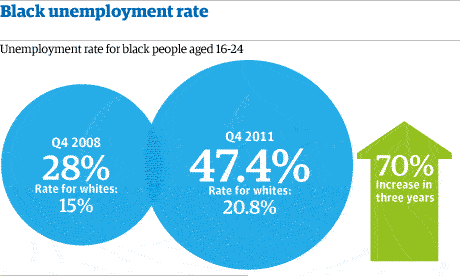Half of UK’s Young Black Males Are Unemployed

Unemployment rate for black 16 to 24-year-olds available for work now double that for white counterparts, ONS data shows
More than half of young black men available for work in Britain are now unemployed, according to unpublished government statistics obtained by the Guardian which show the recession is hitting young black people disproportionately hard.
The new figures, which do not include students, also reveal that the youth unemployment rate for black people has increased at almost twice the rate for white 16- to 24-year-olds since the start of the recession in 2008. Young black men are the worst affected of all, according to a gender breakdown contained within the data supplied by the Office for National Statistics.
Unemployment among young black men has doubled in three years, rising from 28.8% in 2008 to 55.9% in the last three months of 2011.
Although the ONS said the gender breakdown should be treated with caution due to a relatively small sample size, the figures brought calls for further government action from business and community figures in the UK.
Iqbal Wahhab, owner of the Roast restaurant in London and chair of the ethnic minority advisory group at the Department for Work and Pensions, said the figures had exposed an issue that has been “like the elephant in the room”. Wahhab, who runs his own mentoring scheme for young black youths, urged the government to join businesses in tackling the problem. “Now that the figures are out in the public domain, what are we going to do about it?”
He added: “I would love to see ministers doing more. If it is businesses doing it, that’s great, because we are more in tune with how to make programmes run efficiently, but we need to see how the government is going to reverse that tide.”
Black unemployment rateAccording to the ONS, in the last three months of 2008 the unemployment rate for black people aged 16 to 24 was 28.8%. In the most recent quarter in 2011, this had risen to 47.4% – an increase of 70% in three years. This is more than double the unemployment rate for young white people, which increased from 15% in 2008 to 20.8% in 2011. Unemployment among young black women, while still higher than any other ethnic group, is lower than the black male percentage, at 39.1%.
Data breaking down unemployment by ethnicity used to be routinely published alongside official unemployment figures, but has not been released since February 2011, apparently due to changes in how different ethnic groups are coded by official statisticians. However, the data is still collected as part of the official labour market survey, which is used to generate official unemployment figures, allowing this breakdown to be obtained.
On Monday Labour MP Diane Abbott highlighted some of these hidden statistics in a Guardian comment article revealing that the overall unemployment rate for black people had risen to 44%. This was criticised by Channel 4′s factcheck blog which questioned the origin of the data and stressed that the rate did not include students. However, the Guardian has persuaded the ONS to release a detailed breakdown of the figures and found the rate for young black men is even higher than the overall figure used by Abbott.
Asked to respond, the Department for Work and Pensions stressed the overall proportion of young black people who are unemployed was only 22%. This differs because it includes students and others not available for work, whereas the ONS calculates the official unemployment rate as a percentage of the economically active population.
“We have introduced a number of measures designed to give all young people the right skills and experience to match them to vacancies,” said a DWP spokesperson. “This includes the Work Programme, which assesses people as individuals to discover what barriers are preventing them from getting a job and will then work with them overcome these problems. We are also spending £1bn over the next three years to help young jobseekers by creating around half a million opportunities through work experience and apprenticeships.”
Youth unemployment figures are always considerably higher than the general population. This is partly due to the difficulty of tracking students through this data. Most students are excluded from official figures, as they are classed as “economically inactive” – people who are not currently in work, or looking for work – though any student actively looking for full-time or part-time work but unable to find it would be classed as unemployed. It should be noted, however, that black people are less likely to enter higher education than most other ethnic groups.
The reaction among black youths on the streets of Toxteth, the Liverpool district that saw some of the worst inner-city riots of the Thatcher era, was one of frustration. “I’ve handed out over 50 CVs since January,” said Joel O’Loughlan, 18. “Each day I go to the job centre and look online as well. I’ve had a two interviews but I didn’t get either job. You don’t even get a call back most of the time. It makes you feel … I don’t know, like what’s the point?” He added: “Being black definitely makes it harder. Sometimes if you’re going to a job [the employers] look at you like you’re not going to work here, they think you’re not the right kind of person. That’s across the board. I’ve been handing CVs out to coffee shops, shops, you name it. I need the money and will go to uni to do what I really want next year but right now it feels like more than bad luck.”
Nathan Atiko, 24, said: “Sometimes I have in the back of my mind that employers see my surname, see it’s African and write my CV off straight away. I think about changing it because I wonder if they immediately think I might be trouble or I might be lying.” He added: “I can count on one hand the amount of interviews I’ve had. I’ve been to university, I know how to write a CV, do application forms, but my [white] friends from university are getting jobs and I’m not. I’ve looked at their CVs and it’s exactly the same as mine yet they’re getting the job.”
Google’s UK operation is among the companies that have taken a more pragmatic approach to the ethnic employment issue. It makes strong business sense for Google to run a mentoring scheme for black youths, according to the company’s head of search advertising in northern and central Europe, Adrian Joseph. “We believe it makes good business sense. Our ambition is to make information universally accessible to all our users. If we don’t reflect all of our users in the composition of our workforce, it will be much harder to achieve that,” said Joseph. Google’s mentoring programme is now in its second year and focuses on undergraduates and postgraduates with an interest in software engineering.
According to an organisation that advises the public and private sector on employing ethnic minorities, a mass of factors from inner-city schools to unwitting bias against graduates are behind the discrepancies in employment figures, with the confusion exacerbated by a lack of consensus and research on the underlying causes. Race For Opportunity, the diversity arm of the Business in the Community organisation, says the government and businesses should “get their heads together” to tackle the problem, while greater use of mentor figures from families and businesses could make a difference.
Sandra Kerr, Race for Opportunity’s national director, said: “Why can’t everybody have a mentor? There is a whole social mobility dimension that affects you whatever your ethnicity. There are work places that have skilled people who can help with monitoring, reading, being role models. Employers are looking for people who are ready for work and social mobility determines factors such as what school you go to, whether you will get the educational attainment to go to university.”
Kerr added that some employers, including the Home Office and consultancy group Ernst & Young, are attempting to eliminate racial bias in graduate recruitment. “If you leave university and you are ‘Bame’ [black, asian and minority ethnic group], you are still more likely to be unemployed one year on,” said Kerr, ascribing the problem to “that subtext of what you don’t know”. She added: “I think it’s unconscious bias. Some employers are being really truthful about it already.”





